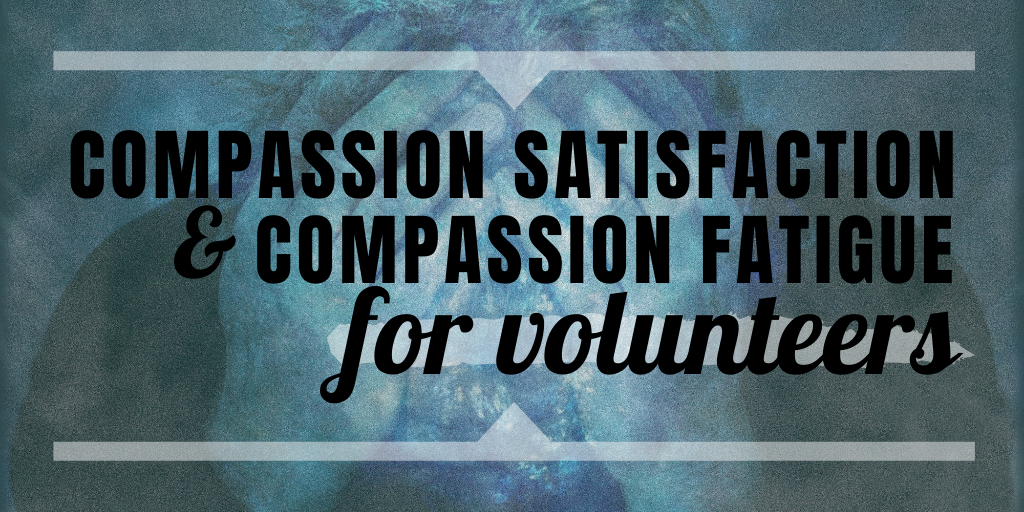
Volunteers who work with vulnerable clients often describe their work as meaningful, rewarding and impactful. The compassion that infuses the work that volunteers do is transformative both for the client and for the volunteer.
At times, it can be demanding and exhausting to work regularly with people who are chronically ill, lonely or experiencing other difficulties.
When engaging in the increasingly challenging context of health and social services, compassion fatigue and compassion satisfaction must become part of the lexicon of the administrator of volunteer resources.
Compassion fatigue and Compassion Satisfaction
Simply put, compassion fatigue can be described as the emotional strain of working with those who are suffering.
The researchers, Larsen and Stamm describe compassion satisfaction as the feelings of satisfaction, control and competency one may experience when supporting others.
Both originate from the same generous place that leads us to caregiving roles in the first place. They are integral parts of the same continuum.
The impact of compassion fatigue on volunteers can include: reduced ability to fulfill their responsibilities, decreased motivation related to their task, increased volunteer absenteeism or “presenteeism”, feelings of isolation, and increased risk of inappropriate behaviours between the volunteers and clients that can translate into withdrawal or over involvement.
In the course of a workshop, the experienced administrators from the Community Council on Volunteerism shared that realistic expectations might have a protective effect in managing compassion fatigue and supporting compassion satisfaction for volunteers.
Volunteers who were able to contextualize the reality of the clients and avoid unrealistic expectations of what they could accomplish and the related outcomes were able to more effectively manage the demands of their role.
Three important variables may influence the experience as it relates to compassion fatigue: the volunteer themselves, the demands of the task and the organizational context.
A volunteer’s characteristics, current life situation and outlook on their role may influence how they are able manage challenging experiences.
The demands of the task, the nature of the issues they may encounter in the context of their commitment, and the intensity of the work are also considerations that can make a difference, as are the frequency and the duration of the commitment.
The organizational context and its ability to support volunteers in maintaining a healthy balance when it comes to compassion fatigue will also influence outcomes.
Supporting compassion satisfaction throughout the volunteer management cycle
While compassion fatigue is sometimes viewed as the individual’s “problem”, it is a volunteer workplace issue.
The organization has some responsibility to prepare and support volunteers for the emotional demands they may face. Volunteers have a responsibility to understand, acknowledge, and express issues they are experiencing that may affect their work.
Prevention
Develop guidelines and put in place supports before they are needed. This could include assessing the demand against the actual number of volunteers needed, developing policies and procedures and position descriptions that address boundaries.
Recruitment
Many hands make for light work. It’s important to have enough volunteers to meet the needs of your organization. I know, more easily said than done but doing this will avoid a potential source of compassion fatigue: the overuse of the same committed and engaged volunteers.
Selection
During the selection process, check for attitude and emotional skills. Be clear about the nature of the work and the type of rewards and challenges volunteers may encounter.
Training
Raise awareness about compassion fatigue and compassion satisfaction.
Help the volunteers identify and manage compassion fatigue and offer ways to stay balanced as they do their important work. Encourage volunteers to have a self-care plan.
One study done with staff and volunteers who worked in the area of bereavement, found that there was a positive relationship between having a mindfulness practice and compassion satisfaction.
Supervision and support
Start commitments slowly and increase gradually. Have regular check-ins, build in task rotations and encourage breaks. At periodic check-ins, consider verifying for compassion satisfaction. Offer sharing opportunities. Peer support or group debriefs are particularly appreciated and effective. Recognition is important, but so is recognizing challenges, along with victories.
Good news – compassion is a renewable resource!
The good news is that even though compassion satisfaction may fluctuate, it is a renewable resource. Celebrating victories, offering outlets to express difficulties and providing training will support compassion satisfaction. In the event of compassion fatigue, early detection and action will ensure that the appropriate steps are taken to restore and rekindle the flame.
It’s important to inform the volunteer of their responsibility to understand, acknowledge, express issues they are experiencing that may affect their work and provide tools and channels that can accommodate this process. As an organization, it’s important to offer support, information and manage issues of compassion fatigue as they occur.
Volunteers have a special relationship with administrators. Whenever possible, be a role model, take breaks, eat your lunch, create boundaries, share the load, and show off your self care plan.
The truly transformative power of compassion, for the volunteer, the client and for the community worth the extra effort to make sure we help to keep it burning brightly.
Marisa Gelfusa is a Learning Designer, Consultant and Trainer who is passionate about accessible and transformative learning. She has worked with organizations such as the Volunteer Bureau of Montreal, McGill University and the Ontario Trillium Foundation.
She is currently a graduate student at Concordia University and has a Master’s Certificate in Adult Training and Development from York University. She is leading a project that promotes inclusive learning activities in the non-profit sector.
